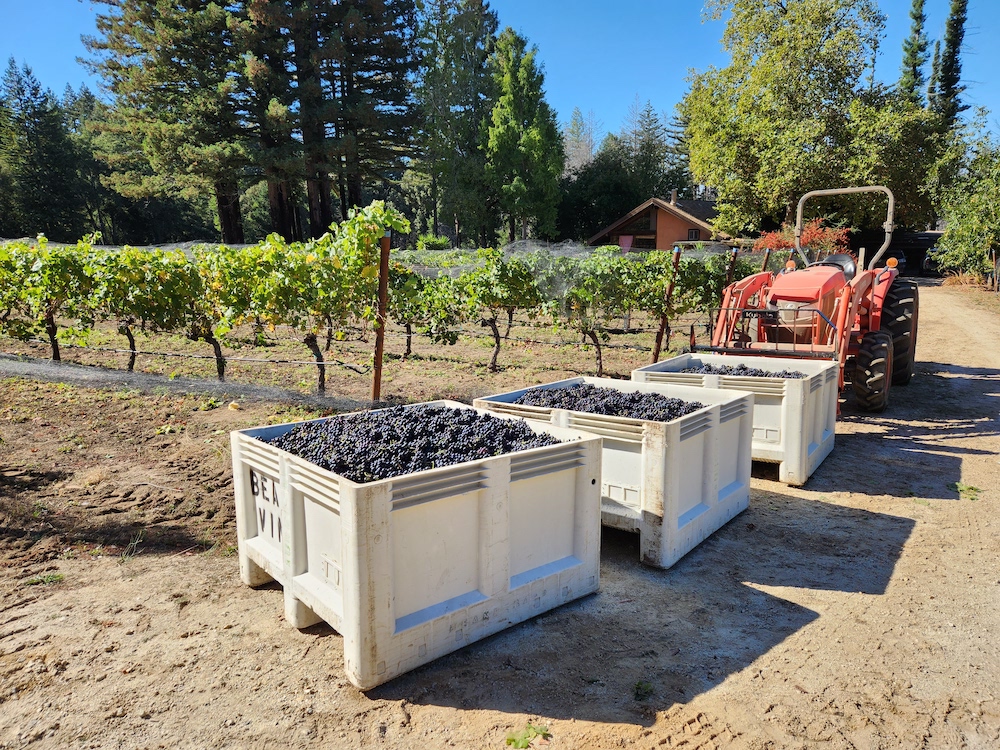
January 12, 2024 – Like the redwoods that survived the devastating CZU fire of 2020, the McHenry family is resilient. That fateful August conflagration that swept through Bonny Doon with a capricious vengeance left many of its residents homeless.
At Beauregard Vineyards, a promising crop was ruined in its entirety by smoke and ash. For McHenry Vineyard, it was a doubly crippling blow. Not only did they lose all their fruit, but vines were scorched, along with their winery building and infrastructure, their family home, plus precious wine in barrels.
It’s tempting to walk away, frustrated by the pace of permitting, the endlessly changing requirements and the logistics and cost of rebuilding, made doubly difficult by the pandemic and ensuing supply chain snarls. Out of 900 homes lost, only 233 rebuilds are in process.
But the McHenry family are not quitters. Rooted in education and the importance of knowledge, they are thinkers as well as doers.
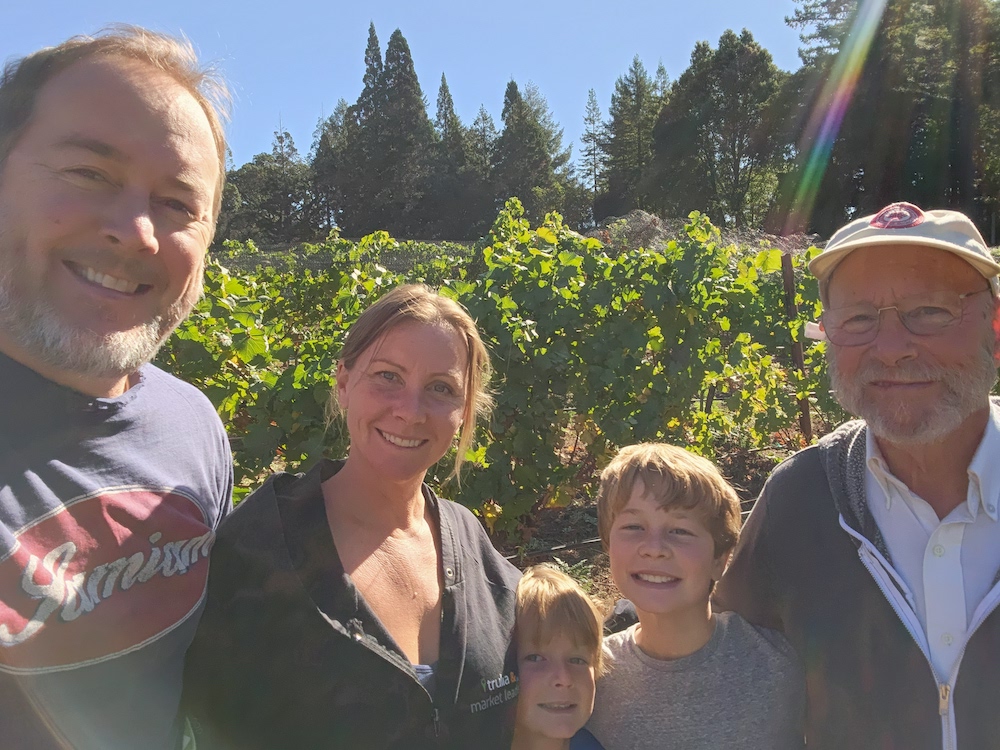
Annalisa McHenry is third generation, the granddaughter of a couple with a tenacious spirit, a love of learning and a dream of living on a beautiful land. Her grandfather Dean McHenry was the founding Chancellor of the University of California Santa Cruz.
Born in Lompoc, he grew up on a walnut and lima bean farm, then majored in political science at UCLA before earning a masters at Stanford and a Ph.D. at UC Berkeley. After teaching at Williams College and Pennsylvania State, he joined the faculty at UCLA. He even ran for mayor of Los Angeles as well as for US Congress. But it was his work on the California Master Plan for Higher Education that led to him becoming founding chancellor of the newly birthed UC Santa Cruz in 1962.
Upon moving to Santa Cruz County that year, Dean and his wife Jane, whom he met at Stanford, bought 80 acres in Bonny Doon.
“He wanted land,” says Annalisa, herself a third-generation educator, who lives in Oakland and teaches 3rd grade at Hesperian elementary school. “It was a Christmas tree farm at the time.”
They began planting grapes in 1970 and when Dean retired in 1971, he and Jane moved to their beloved Bonny Doon farm, where they built a home and lived until they passed away: he in 1998, and she in 2013, at age 101.
At 1,800 feet elevation, the vineyard on Bonny Doon Rd. was rooted in mostly sandy soil, surrounded by redwoods, and those gargantuan Christmas trees. It was completely dry farmed once the vines were established.
In 1974, four more acres of vines were planted, with the involvement of Annalisa’s father, Henry, a paleontologist and professor at UC Davis, and her mother Linda.
“He talked to his colleagues in the viticulture and enology department and they told him this spot would be perfect for Pinot Noir,” she says.
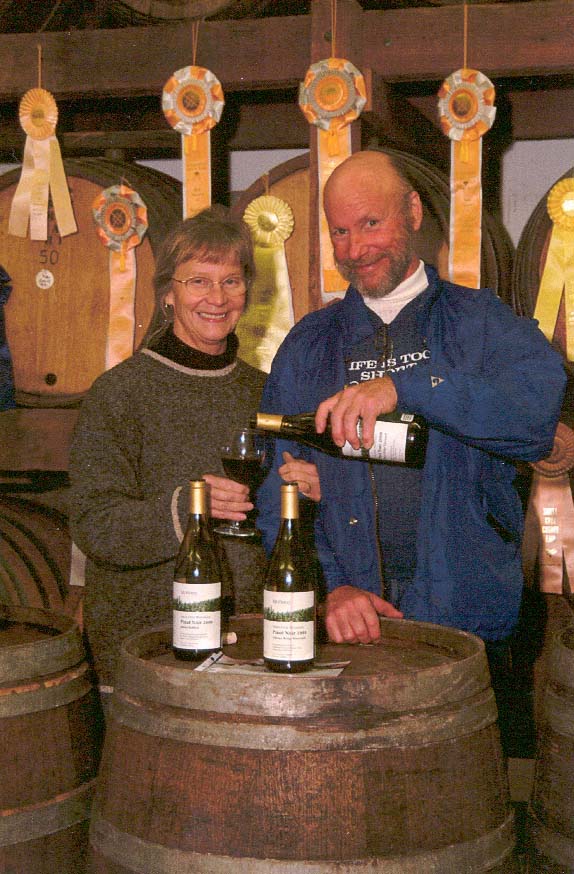
They also installed some Chardonnay, Pinot Blanc and a little Riesling as well. The winery facility was built in 1980.
“It was fantastic wine!” says Annalisa. “My grandparents sold grapes for a few years and got bonded in 1980. Pierce’s disease killed the vines in the early 1990s.” She thinks that Hallcrest and Felton Empire might have gotten some of the fruit from early vintages.
During the 2-acre replant in 1997, they went strictly to Pinot Noir, planting Martini, Pommard, 115 and Swan, under the direction of Linda, who had taken a keen interest in viticulture. They added .4 acres in 2009, planting more Swan clone, as they found it was doing well on the property. So well, in fact, that they began bottling a McHenry Swan Pinot Noir in 2003, when they had enough yield. And that’s always been the challenge: getting enough fruit to make it all worthwhile.
Annalisa’s parents ran the winery until 2013, when Linda began suffering from dementia, and was unable to care for her beloved vines. She had been in charge of viticulture, while Henry was the winemaker. One of Linda’s insights was choosing clones that bloomed and ripened at different times, increasing the chances of productivity, given the proximity to the coastline, where cool springs can wreak havoc on early bloomers.
From 2007 until 2010, Annalisa and her husband Brandon Blanchard lived on the property. They had planned to take over the vineyard and winery operations, but had their first child in 2013 and moved to Oakland. It was a momentous year.

“The year my grandmother died, 2013, was the biggest harvest we had ever had!” she told us. “We got 24 barrels worth in 2013, the most ever. Actually, 2012 was huge, too.”
From 2015 on, though, the drought really impacted the vineyard. Being traditionally dry-farmed, the vines didn’t fare well, and Pierce’s disease came back. “We pulled out 20 percent of the vineyard in 2018,” she acknowledges.
Both 2018 and 2019 were small yields, and everything in barrel was lost to the to the CZU fire. Two barrels of 2019 were stored off site, but most of the 2019 vintage was lost.
In addition, they lost all their library wines from 1980 through 2012 that had been kept at the winery. They began storing wines at CWT as of 2013, so at least some of those vintages remain.
For the ill-fated harvest of 2020, they had estimated 7 tons of fruit, but all was rendered unusable due to smoke taint. Additionally, 75 vines were destroyed and quite a few others damaged. In 2020, they bought enough fruit from Christie Vineyard in Corralitos, to keep them in product.
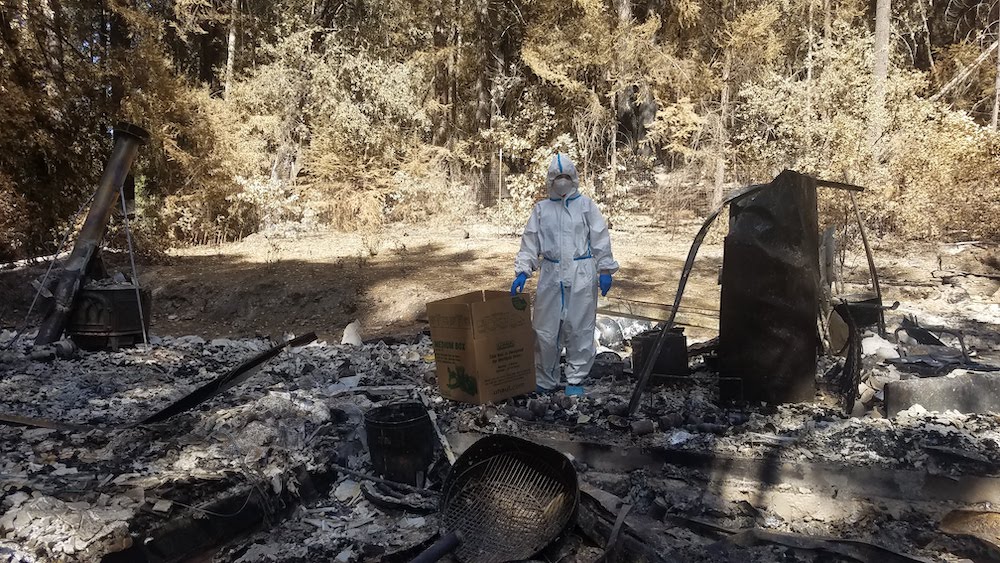
The following year, 2021, was blessedly a big year. But then came 2022 and 2023, which were both very small, due to the heat of 2022 and the poor set of 2023.
“Honestly, 2023 was a bit of a nightmare,” admits Annalisa. “We generally have at least four picks, due to the different clones, but with the late set, late summer and delayed ripening, we ended up picking at the end of October. I remember picking some fruit in early October in the past, but historically, we usually started in mid-September, and sometimes even in late August. We always try to keep the alcohol low, so picking early is important.”
With the winery in ruins, they turned to their Bonny Doon neighbor Ryan Beauregard for help in making the 2021 wines. He agreed to let them make wine at his facility for vintages 2021 through 2023.
Blanchard, who is now in charge of managing the vineyard and is also the winemaker for McHenry Vineyards, was a product manager for a tech company prior to the 2020 fire.
Now, he spends his time trying to manage the rebuild and deal with all the insurance claims, along with the usual day-to-day efforts of managing a vineyard. Living in Oakland adds to the complexity. “We would love to move back to Bonny Doon,” Blanchard admits, “But with two young kids who have a fantastic situation where we live now, it would be really hard to move.”
Adds Annalisa, “We had bought a lovely tiny home to put on the property after the fire, but it turned out not to be waterproof!”
They hope to rebuild the 3-bedroom house where Henry and Linda lived, and are in the process of restoring the smoke-damaged home that belonged to Dean and Nancy. Working through insurance claims and permitting with the county has extended the timeline far beyond their expectations.
For now, they are primarily concentrating on getting the winery reconstructed, but are dealing with geological issues due to the danger of boulders coming loose on the steep redwood covered slope. The fire wiped out most of the trees, so there is a fear of erosion. They also need to install a new septic system, as well as a 10K gallon water tank, and roads and drainage systems must be constructed. But everything is on hold.
As of Oct. 15, all earthwork must cease in Santa Cruz County, so they are basically stalled until spring. It is increasingly doubtful they will have the winery rebuilt in time for 2024 harvest. Although they’ve milled a lot of the fallen trees already, hopefully to use in the reconstruction, there are still between 100 and 150 Douglas Fir trees that need to be felled.
Blanchard admits, “The place looks like a lumber yard now.” He adds that they are also looking for an architect and engineer to assist with the rebuild.
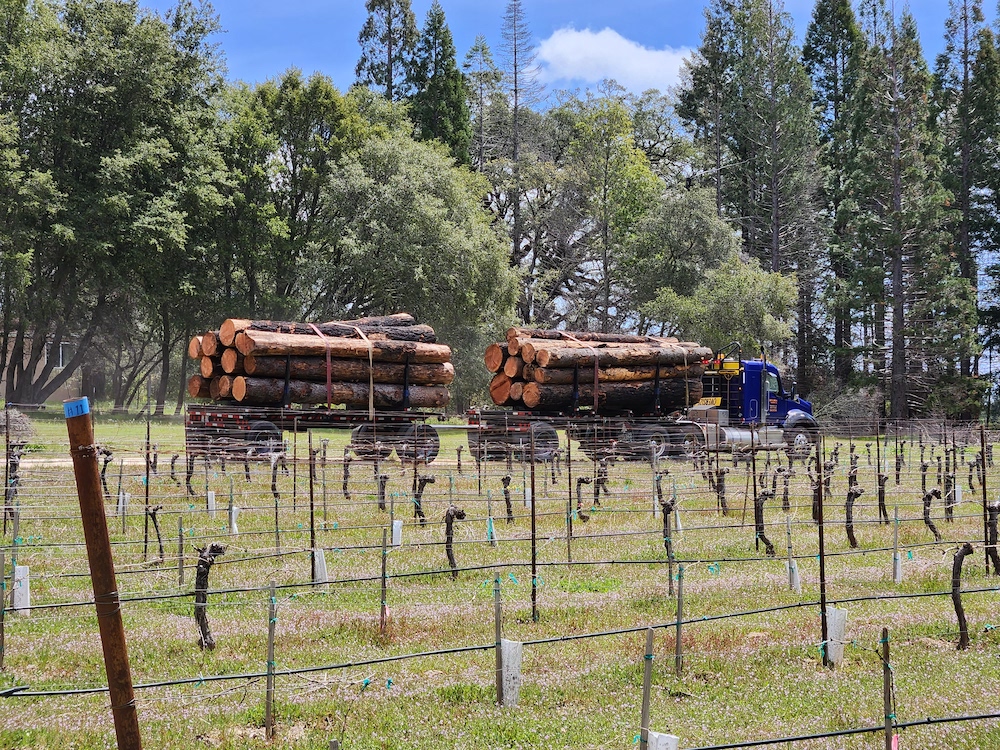
“We feel lucky that the vineyard survived,” says Annalisa, taking the long view.
“The house my Mom built is a big sentimental loss. Unfortunately, it was underinsured. The winery loss is such a tragedy, even though we always thought of it as Grandpa’s foolish idea!”
A lot of Pinot Noir lovers would beg to differ, as McHenry wines have long been prized. In the past, half of their wine was sold direct at onsite events like the SCMWA Passport program. McHenry was among the founding members of the Santa Cruz Mountains Winegrowers.
While the fire has certainly monkey-wrenched things, the couple still has hope. They are grateful that there is still interest in their wine, which can be purchased online and at Shopper’s Corner.
“We want to have a small tasting room in the new winery,” explains Annalisa. “We already have a live-edged milled redwood set aside for the bar.”
They’re even thinking about planting more vines, once they get the winery built and the tasting bar installed.
Hope, and vines, spring eternal.
Taste McHenry At Beauregard Winery On Passport Day, January 20
Ryan Beauregard has generously offered space to McHenry Vineyard’s at his venue in Bonny Doon so they can share their wines for Passport Day, which is Saturday, Jan. 20. Annalisa will be pouring a selection of their wines, including the 2020 Christie Vineyard Pinot Noir, the 2021 Estate Pinot Noir and 2021 Swan Clone Estate Pinot Noir.
About the author
Laura Ness is a longtime wine journalist, columnist and judge who contributes regularly to Edible Monterey Bay, Spirited, WineOh.Tv, Los Gatos Magazine and Wine Industry Network, and a variety of consumer publications. Her passion is telling stories about the intriguing characters who inhabit the fascinating world of wine and food.
- Laura Nesshttps://www.ediblemontereybay.com/author/lness/
- Laura Nesshttps://www.ediblemontereybay.com/author/lness/
- Laura Nesshttps://www.ediblemontereybay.com/author/lness/
- Laura Nesshttps://www.ediblemontereybay.com/author/lness/


